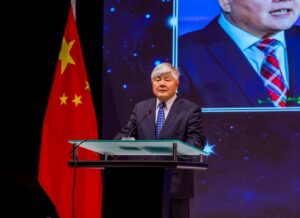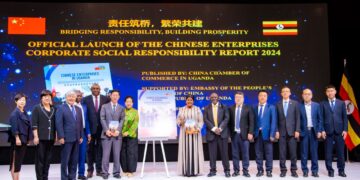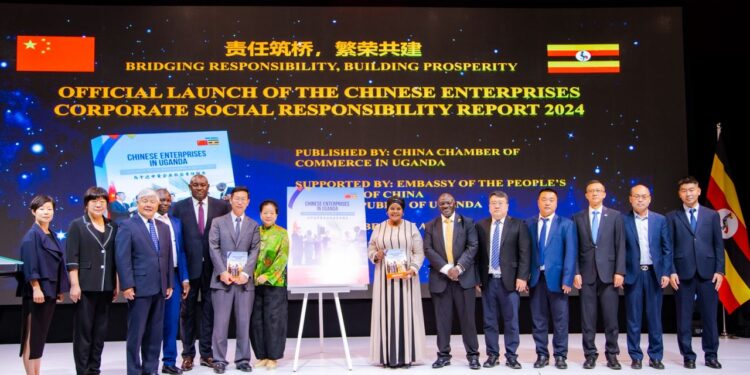Chinese companies operating in Uganda have renewed their pledge to support the country’s development through infrastructure projects, community initiatives, and social programs.
The commitment was made at the launch of the Chinese Enterprises in Uganda Corporate Social Responsibility (CSR) Report 2024 Edition.
The report, unveiled by the Uganda Chinese Chamber of Commerce, highlights investments and community projects by Chinese enterprises in education, health, energy, agriculture, environment, and digital innovation.
The event was officiated by Lukia Nakadama, Uganda’s 3rd Deputy Prime Minister, Minister Katumba Wamala, The Ambassador of the People’s Republic of China to Uganda, H.E Zhang Lizhong and Mr Diao Chunhe, Chairman of the China-Africa Business Council CSR Alliance, among others.
Nakadama commended Chinese companies for complementing Uganda’s Vision 2040 and the National Development Plan. She noted that the Peoples Republic of China has been one of Uganda’s most reliable partners since independence in 1962, contributing to projects such as the Karuma and Isimba hydropower dams, the Entebbe–Kampala Expressway, and the expansion of Entebbe International Airport.
“Corporate social responsibility is about more than business. It is about uplifting communities through education, health care, water and sanitation, youth empowerment, and environmental protection,” Nakadama said, while conveying greetings from President Yoweri Museveni and Prime Minister Robinah Nabbanja.
She praised Chinese firms for offering scholarships, medical support, vocational training, and disaster relief.
Ambassador Zhang Lizhong emphasized that Chinese enterprises in Uganda are committed to both investment and community development. He cited the impact of the Karuma Hydropower Plant, ICT training programs by Huawei, and free medical camps organized by Chinese companies.
“The CSR report is not just a record, but also a pledge,” Ambassador Zhang said.
“Chinese enterprises stand ready to work hand in hand with Uganda to build a more inclusive, sustainable, and prosperous community with a shared future.” He added that trade between the two countries has reached US$1.148 billion by July 2025, a 41.5 percent increase from last year, with Uganda’s coffee and sesame exports nearly doubling.
Hon Diao Chunhe, Executive Chairman of the Alliance of Chinese Business in Africa for Social Responsibilities, Over the past year, our member companies have actively responded to Uganda’s development strategies, working closely with local communities.
“From building roads and bridges to constructing schools and hospitals; from investing in green energy to promoting digital transformation; from creating jobs to offering skills training; from caring for women and children to protecting the environment — Chinese enterprises have made contributions across multiple fields,” he said.
Adding, “These efforts have not only improved local livelihoods but also strengthened the bond between the peoples of China and Uganda. Many community members have told us that Chinese enterprises bring not only investment and technology but also sincerity and warmth. This recognition is our greatest encouragement.”
Mr Li Jincheng Chairman of the China Chamber of Commerce in Uganda noted that the Uganda report is within the broader framework of the “100 Chinese Enterprises for 1000 Villages” Initiative, launched under the Forum on China–Africa Cooperation (FOCAC). He said the program has delivered over 500 projects across Africa, benefiting 10 million people.
“In Uganda, Chinese enterprises have implemented small but impactful projects in rural electrification, water supply, and mentorship programs for youth,” Diao noted.
He pledged that more focus would go towards maternal and child health, education, and rural development.
To mark the launch, Chinese companies donated school supplies and necessities to local children.
“The story of Uganda–China cooperation is one of friendship, resilience, and shared prosperity,” Nakadama said.











